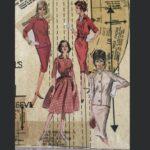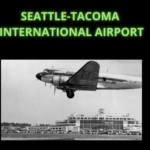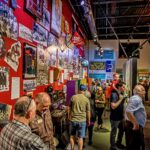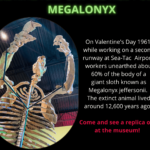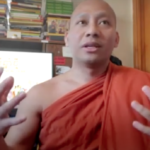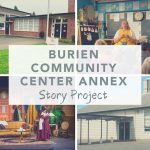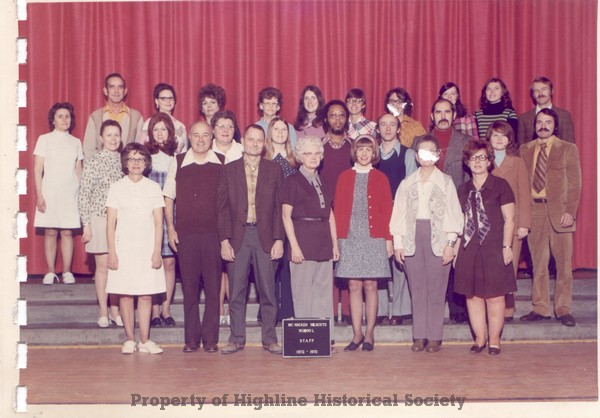October 8, 1998 • Interviewed by Jane Carter
I came here in 1943 from Ohio where I had grown up and lived for many years. Of course, that was during the War and I came with my high school adviser, a basketball coach. We both had boyfriends out here. So we decided that we would come out here for a summer vacation in 1943. But you were not supposed to just vacation during The War, you were supposed to work. So we both hired in at Boeing for the summer. Interestingly enough they put both of us in on inspection, which amused me greatly.
Most of the people there actually were teachers, so they convinced us, during the summer, that we should stay here. So my adviser, Dorothy, with whom I had come, interviewed at South Central (school district) and she took the job. I couldn’t quite decide that I wanted to stay. But, you know, it finally got the best of me. Finally I went into L.M. Dimmit’s office and said, “Do you know where I can get a job?” He said, “I think L.D. Baker needs somebody out in Highline.” So I changed clothes, after Boeing, and came out on the Interurban to Seahurst, and walked down to L.D. Baker’s house.
He took me all around, up and down the hills on Roxbury and what not. When we came there he said, “How would you like to teach there?” There was no building there but he said, “Well, there will be.” So I said okay. So I started teaching at White Center Heights in 1943.
I had been a principal in this district (Ohio) for three years and taught there for ten years, the school where I had graduated from in Ohio. I never wanted to be a principal again, but anyhow the word got around and that’s where I ended up eventually.
White Center was a very interesting school because people were from all over the place. It was very difficult to find housing in those days, and the project was developed there around the school. John Aven was our principal and he had a completely new philosophy that I had never known back east. For example, back east you never asked to do anything or be on any committee or anything. You were supposed to be asked. Bet here it was very democratic and you were supposed to volunteer. So I started volunteering, and I guess that’s my downfall.
Anyway, there were interesting things that happened there. John wanted to start a PTA, and of course we didn’t want a PTA. (Which now I can’t believe.) It took us about three years to get that organized. Many of the people who ended up in our administration building were people that lived there: Bea Warfield and Bob Burgess. Frank Anderson lived close by. It was just a wonderful place to be.
Dorothy Thordarson came along as the first curriculum consultant in about 1948 or ‘47. We happened to be in a class together at the University of Washington, so she kind of felt that she knew me. So I was the first person that she observed when she went around. And pretty soon she said, “There’s going to be a new school up at McMicken Heights and L.D.’s (Baker) going to ask you to be the principal. I didn’t know where McMicken Heights was or anything about it. So when she would see me from time to time she would ask, “Well, has he asked you yet?” And I’d say, “No.”

During that time we had a lot of curriculum committees. We wrote a social studies, about an inch thick, for elementary and junior high and high school. The custom was that we would have a workshop in the fall and introduce this to all the teachers as an introduction to it. So I was there, as a member of the committee. L.D. was there standing by the door. So I spoke to him, and he said, “How would you like to be the new boss up at McMicken?” So that was the way it happened. I pretended I hadn’t heard anything about it. So I said, “Well, I don’t know, I’d have to think about that.” But pretty soon I said, “Yes,“ and that’s how I got to be principal up at McMicken Heights School. Little did I know what the community was all about when I got there. But I learned a little bit later.
During The War there were few housing projects. This was a project of single homes, small but very adequate, and people were buying them by the dozens. Those people were saying that they needed a school up there. Of course, the consolidation of the Highline District had taken place only a few years prior to this time. So I don’t believe they knew where McMicken was either, and I don’t think that they thought it was important to have a school. So, those people went around with petitions and took them to the state superintendent of schools, Pearl Wanamaker. That didn’t bring very good feelings between the school board and the school. So I learned later that I was supposed to “mend the fences” so to speak, which took quite a while. We had a marvelous community and a lot of people who were very interested in assisting with the school. I remember sitting in the office with the secretary before school in September in 1949. One of the parents walked and said, “We want to start a PTA.” So I said, “Fine.” They were very supportive and we had a wonderful group. At that time we had only six rooms and I was just the head teacher. There wasn’t enough for a principal.
Then the next year we had seven rooms added, which was thirteen altogether, so this same group of people decided that they wanted to have a dedication of the new school. That was something that had not taken place in the schools in Highline. They invited Pearl Wanamaker to be the speaker. So I told L. D. and he said, “Well, don’t you know that’s the prerogative of the school board?” Well, they had made all these plans and there I was, you know. So, I knew I would have cried if I had stayed, so I just got up and walked out. So then Dorothy Thordarson reported that L. D. was just pacing the floor; he’d never had a principal walk out on him before. So finally she arranged for us to meet on Saturday and some of the school board members came over to the dedication and so forth, and we got everything worked out. But that was quite a traumatic experience.
Every program that we had we would always bring in the parents and see if they would be willing to try the program and so on. So we did many many things. We had a divided reading program which was spread around a little bit, and we had a continuous reading program. When parent-teacher conferences came along we did that. So it was really quite a community school. I have very fond memories of being there. The people were very helpful in developing the school and its program.
Going back a little bit, when I was at White Center Heights School we were on double shift much of the time because there was not enough housing for all of the children. We had a room in the school where we would comb our hair and get ready for school. I rode from clear out in the University district and never combed my hair before I left because if I had the fog would have taken everything out. So we were all in there getting ready for school. One of the teachers, Minnie Muse, said, “I was over in Spokane this week-end purchasing clothing for my friend’s shop. And you know there’s a place over there at 136th and First Ave South where we could start a dress shop.” So my ears were perking up and I said I always thought that would be fun. And she said, “You know, there’s a really good-looking butcher over there too.” So we went to look at it, and we signed the lease, and believe it or not we started a dress shop with about $1500, if you can believe it.
Those buildings are not there now. But at that time it was one of the first shopping centers in the area. It was called the Glendale Shopping Center. It had a series of stores on one side and a grocery store on the other side with parking in the middle. In our area there was a hardware down along the highway. On the corner there was Dave’s Restaurant and then Rosemin’s Apparel and then a flower shop and a shoe repair shop and a plumbing shop. Across the parking lot was Herron’s grocery store in which my husband (the good-looking butcher that I later married) had Roff’s Better Meats. On the corner there was a drug store and a beauty shop. So all of that is gone now. I thought it might be interesting to note that.
Getting back to how we started, my partner Minnie Muse was on one shift at the school and I was on the other. So we thought, “Well, she’ll run the store when I’m teaching and I’ll run the store while she’s teaching and that’ll just work out fine.” But it turned out that next fall we went onto single shifts and so we had to hire a lady. So that took most of the profit. We didn’t have an adding machine, but I really learned how to add because I was the bookkeeper. We had a wood stove in the back, and when we started our principal, John Amin, built all the dressing rooms in the back and build the clothes racks and the showcase and whatnot. And it was really quite an interesting project. We operated that for about five years and in the meantime I had gone over to McMicken. So we were very happy to have somebody just pay us for it. When we went to file the income tax there was no profit. So we were checked. I had kept every sales slip we’d ever had, so I took all these boxes down to the IRS. And he said, “Well, I think it’s all right.” We decided that the profit that we had made was sthe clothing that I wore. That’s the way that went.
My maiden name was Rosella Zuber, a good old German name. My paternal grandparents came from Germany, both of them.
My recreation frequently was my job because I loved people and I loved working on things. But also the usual things that people that age do. We just socialized and had parties and that sort of thing. Nothing real special.
One of the things that transpired in the community, because it had very few social services, was the Highline Youth Council, which started in 1962 and operated for about ten years. That was sort of a hatching place for many of the services that have become very helpful in the community. One of them was the Highline Mental Health Center, which we had great visions for all the services that it would provide, how wonderfully it would expand and really be a great asset for the people who needed assistance in this area. I was the first chairman for this area and I just remember how we worked and gathered all these names for membership and whatnot. It got off the ground, and now it is so expansive that you would have to look around to find all the places where it is.
Another thing that I thought was so wonderful was the juvenile court conference committee, which was Gary Utigard, one of the local people was very instrumental in that. It was a system whereby the children who would commit small crimes, or things they shouldn’t do, were brought before a community council, and then they told them how to correct it and how to work on it. Then they would not have a record in the courts if they were doing this. I was just calling a few minutes ago to see if those things were still operating, and they are, which I think is just marvelous.
One of the great things that happened, we were finally able to get a Big Brother program in the district. We worked on that for about ten years, but it seemed to be kind of an exclusive thing in the city of Seattle. And they weren’t listening to the outlying areas much. We finally did get it going in about 19670. We had been so upset because they had not recognized us for so long, we decided that we were not going to be a part of them, but were going to have our own program. So we spent a great deal of the time in the first two or three years, to support this. We did get one grant which was wonderful to help us get started. Now it is a part of the county-wide program. Personally I believe it is one of the greatest things that you could support because it not only cuts the cost in a preventative way for these young people who might later have problems, which would cost the public as much money later on. So I think it’s one of the things that I supported. I was on the board for 24 or 25 years, I don’t remember. I think that everyone should give that great consideration, so that these children who don’t have role models can have a male in their life with them.
The group that I was associated with did not include the Big Sisters organization. There is one that is important, but I was not on that.
In Ohio before I came here I was a member of the Delta Kappa Gamma society, which is an educational honorary society for experienced teachers. When I came out here I transferred to the Omega chapter and was quite active here. One of the major things that we did in the 60’s and late 50’s was to sponsor legislation for state scholarships. We also surveyed a great many high schools in the state as to all of the things that might have to do with the gifted child, because that was a very important topic at that time. So in collaboration with a gentleman at the university of Washington who was trying to get his doctor’s degree we did all the leg work. He made the surveys and we mailed them out, and then we tabulated them by hand. We had no computers, so we met here Saturday after Saturday doing all that and putting it together for him.
Then we sponsored legislation in the state for state scholarships for capable youth. And we wrote a little book which was printed in the print shop at Highline. Andy Hess was the one who sponsored the bill in the Legislature. It paved the way for thinking, but it didn’t pass, of course. At the same time there was discussion about the expansion of junior colleges in the state. At that time I think there were only nine junior colleges, and of course you know how many junior colleges there are now. It was a wonderful thing too.
I was research chairman in the state at that time and then a couple of years at the national level in Austin. So that was a very interesting thing that I enjoyed and felt that it had some merit to it.
Another thing, there was a lady, a missionary who had worked in China, a Dr. Weallthy Fisher who started a program in India called World Education. It was teaching the Indian people agriculture, health habits and all sorts of things. When we were at a convention in New York City she was there. And of course she was wanting us to get behind that program. So when we came back we had her come out here and speak at Highline Junior College, trying to introduce the program that she was doing in India. Delta Kappa Gamma sponsored that. Then we went together with the India Society of Seattle and the Center for Asian Arts and the University of Washington and with the help of the Philadelphia String Quartet we put on a concert and raised money for this program. That was a very interesting and worthwhile one. It’s still going, and I was just looking for thel atest reports on what they’re doing. They’ve expanded greatly, and they’re just down there at the grass roots, working with the people of India. So that’s one thing that I thought was a very interesting program.
Somehow I got hooked on collecting Collector plates. I was going to give a set to each of my grandchildren when they were married. But I did much more than that, to the extent of about 400 plates, I guess. So I have all those boxes in the back room. Now I have tried to get rid of many of those. So I have been taking them, not only to our church, but also to Delta Kappa Gamma meetings, and also the Highline Retired Teachers. Whoever would like to buy some, the money would go to scholarships or some other designated program. I probably have gotten rid of about 100 of them now.
We had one pet, when we were first married, called Calico. He was just the greatest cat we ever knew. We kept him until he died, and then I guess we were just too busy to have any more. I like to pet other people’s pets.
 Talking about earthquakes. When I was at White Center School, that was an old wooden building. Back in the forties when we had the big one, that wooden hallway looked just like an ocean wave going up and down. So that was quite an experience. Then the next one in 1965 I was up at McMicken. That one was before school, thank goodness. I had a vase sitting on the top of the file, and it started going back and forth. That was the second earthquake and I don’t believe there were any other ones. Of course, the storm we had two or three years ago, this place looked like a forest had been cut down, limbs all over the place. I had never experienced an earthquake before, so that was traumatic, and especially when you have a bunch of children.
Talking about earthquakes. When I was at White Center School, that was an old wooden building. Back in the forties when we had the big one, that wooden hallway looked just like an ocean wave going up and down. So that was quite an experience. Then the next one in 1965 I was up at McMicken. That one was before school, thank goodness. I had a vase sitting on the top of the file, and it started going back and forth. That was the second earthquake and I don’t believe there were any other ones. Of course, the storm we had two or three years ago, this place looked like a forest had been cut down, limbs all over the place. I had never experienced an earthquake before, so that was traumatic, and especially when you have a bunch of children.
Thinking about storms, we had a terrible snowstorm when we were at McMicken. We sent the children home and then I put chains on the car and drove up and down the roads to make sure that there were no children around any place.
I don’t remember where we bought our groceries when we first came here. I guess it was in the University district. But I can tell you one thing, there was place called the Dari Dell about two blocks from where we lived. We needed milk for breakfast, so I walked down there and the gentleman who owned it was setting down chairs and so on. He looked pretty desperate and I said, “It looks like you need some help in here.” So he said, ”Yes, I do. Do you want to come back and start to work?” So I went home and changed clothes and went back and worked for quite a while. In fact, those yearly years, I came through the Depression when I was going to school. So I had college debts to pay back, so I was working two jobs for quite some time. I also worked at the King County Recreation Dept. over at the White Center Field House for a couple of years. I would start out at five o-clock in the morning and get out to White Center school for the double shift. We started school at eight o’clock and got through at twelve o’clock, and then I’d make lesson plans til one. Then I’d walk down to the field house and work for eight hours. I’d get home about 10:30 or 11:00 pm, go to bed and then get up and start out all over again. So that’s how I paid my college debts.
I’ve lived in this home since 1954, 4410 S 148th St. One of the gals back home when she had gotten married she had her whole house furnished and was married in the home. That sounded great to me. So that’s what I did. I had the decorator come in for all the flower arrangements. I believe it was a Sunday morning. So I had an old dress on because I’d been getting ready. The decorator asked who was getting married, and I said I was. So that was quite a shock to see me standing there in an old housecoat. I leaner late from one of my friends, who had a restaurant, that my husband, who had come there for breakfast, was looking very glum that morning. When she asked what was the matter, he said, “I’m getting married today.” I don’t know if he regretted that or what, but anyway, we had a great life together.
On of the things that we enjoyed doing –he loved to fish and was quite a fisherman—so we bought some property down in Long Beach, Washington. So he would go fishing and I would go clam-digging. Of course, the store didn’t close until about 9 pm, so we wouldn’t get down there til about 1:00. Then he’d get up at about five to go fishing and I’d go to the beach. Then we’d come home dead tired, but we’d had a wonderful weekend and just thought that was great. We spent many wonderful years down there.
Talking about the Big Brother program, I have given all the Minutes from the beginning to the end to Mike McKinney, so he would be the person to contact if you ever wanted that information.
After living in this home for 46 years, I will be moving to Monroe now, closer to my stepson nd his family, and my first daughter-in-and her family who live in Lake Stevens.
Its been a great time here in Highline.






